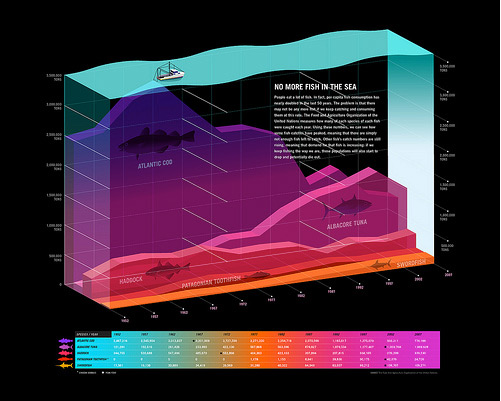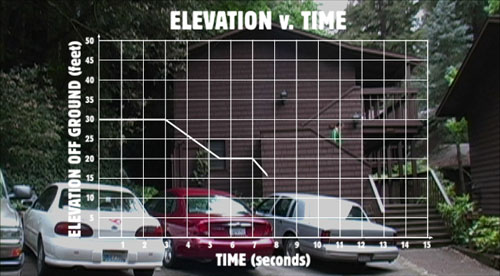On the importance of ‘real-world learning’
Image BY-NC ms4jah @ Flickr
As with many things I write about on this blog, three things have come together recently to make me think about an issue in more detail. Briefly, these are:
- Discovering Courtenay Bird’s blog (via @Stammy) where she posts links to interesting and useful infographics.
- Reading @mortenoddvik‘s blog mortempo – and in particular his post Didactical Project: Cultural or Intercultural Competence?
- Revisiting Dan Meyer’s excellent work at dy/dan – especially posts like Graphing Stories (from a couple of years ago)
I don’t know when or how it happened (I suspect high-stakes testing had something to do with it) but we’ve managed to completely disconnect teaching and learning from real-world experience. There’s a few pockets of good practice and glimmers of light, obviously, but behind a lot of what happens in classrooms is “you’re doing this because it’s on the test.”
Thankfully, the three examples above point to something different. Here’s how:
1. Infographics
I came across Courtenay Bird’s blog just before I intended to head off to bed one evening this week. Courtenay’s interests lie in sales, marketing, project management and technology. Hence her interest in infographics. Here’s an example:

It got me thinking about project-based learning and how fantastic creating an infographic would be as a learning experience for students. By their very nature infographics demand a level of expertise by the person who creates them. Look at the research David McCandless at Information is Beautiful carries out before producing one of his masterpieces!
Infographics have to reflect real-world issues and do things with data that interests people. They have to be relevant and meaningful. That’s why I think they’re great for what I would called ‘real-world learning’.
There’s more wonderful infographics below:
2. Cultural references
I’ve only just come across Morten Oddvik’s work. Morten is an innovative Norwegian educator who focuses on learning outcomes rather than activities. A recent blog post of his – Didactical Project: Cultural or Intercultural Competence? – caught my eye because he’s doing something very difficult: using media-focused cultural references to enhance students’ learning about important (and quite high-level) concepts.
Take a look at this:
[googleapps domain=”docs” dir=”present/embed” query=”id=dd6hg9pn_328cswgwrhn&size=s” width=”410″ height=”342″ /]
As you can see, Morten hasn’t simply taken the rap-music-is-a-form-of-poetry route. Instead he’s done something infinitely more valuable; he’s using something students are already interested in to help them learn about a range of concepts. This is another example of project-based learning. Morten’s focused on learning outcomes and using the content as a scaffold towards that. Great stuff! 😀
3. Real-world problem solving
Finally, I’ve revisited the work of Dan Meyer recently. Dan blogs at dy/dan and is well known within the edublogosphere for his high work rate and high-quality resources. As my Dad’s recently gone to the UAE as a consultant Maths teacher, I’ve been showing him some of the stuff Dan’s been up to.
I think one of my favourite posts by Dan is one from 2007 entitled Graphing Stories. In it, Dan chronicles not only a formidable amount of work on his part as if it were nothing, but how his high-quality resources and use of human interest led to huge learning gains by his students:
I’ve seen some really bad, disconnected-from-reality lessons during my teaching career thus far. And it has to be said the worst one I ever saw was a Maths lesson. Dan shows on his blog how even the most abstract of concepts can be taught visually, kinaesthetically, and engagingly. That, to me, is what it’s all about!
You should definitely check out his series What Can I Do With This? where Dan takes images and uses them to teach mathematical concepts. Inspiring! :-p
Conclusion
The above shows that if educators focus on learning outcomes rather than activities to take up lesson time (and the high-stakes examinations at the end of a course) then real progress can be made by students. As a subject specialist it paints me to say it, but I think it’s time to move to a project-based curriculum where skills and competencies are focused on rather than simply ‘knowledge’.
Tracey Rosen has a new blog called Teaching is a Verb which focuses on collective action to improve teaching and learning. I’ll leave you with a post she shares in a post entitled Teaching 101:
If you want to build a ship, don’t drum up the men to gather wood, divide the work, and give orders. Instead, teach them to yearn for the vast and endless sea. (Antoine de Saint-Exupéry)



![Reblog this post [with Zemanta]](http://img.zemanta.com/reblog_e.png?x-id=0cd087f9-9903-47e4-a179-5a5b01fa4265)
Doug,
Thanks for the pointer to infographics. I wasn’t really aware of this area of study – design meets data! I like it . . . a lot, and I’ll be looking out for more. Wonder how we might use infographics to encourage our students to think about how they present information? Also wonder if there are any sources of infographics with an educational focus? Feel some searching coming on!
A slight aside if I may. In your conclusion you point out the importance of learning outcomes. Earlier today I was trying to get a better handle on learning objectives and started with a Google search which returned:
http://teaching.mrbelshaw.co.uk/index.php/2006/01/20/how-to-write-better-learning-objectives/ …which is unfortuntely no longer available
Are your comments still around in a different location? I’d be really interested to read your thoughts.
Hi Ian,
Thanks for the reminder r.e. learning objectives. It’s something I need to revisit so expect a blog post soon! :-)
Doug,
I can see what you are trying to say here but I feel compelled to respond to your comment about:
“I’ve seen some really bad, disconnected-from-reality lessons during my teaching career thus far. And it has to be said the worst one I ever saw was a Maths lesson.”
It is often assumed by many non-Mathematiciansthat the purpose of Mathematics is to be useful or practical, and in mine (and many others opinions) nothing could be further from the truth…
It may be worth at this point saying that the introduction of the term ‘numeracy’ at primary was one of the few good things that the NC did for Maths. I am happy to accept that ‘numeracy’ is a practical skill, but the Mathematics studied at secondary school is not numeracy and is not as a general rule useful…
Pure-Mathematics should be totally disconnected from reality, as it is not attempting to describe ‘reality’ but abstract possibility. The Physicist will attempt to use Mathematics to describe what happens in our universe, it is the job of the mathematician to describe what could happen in any universe.
GH Hardy who wrote one of the seminal works on the Philosophy of Mathematics (A Mathematicians Apology – http://www.math.ualberta.ca/~mss/misc/A%20Mathematician's%20Apology.pdf) goes to great lengths to explain that for him Mathematics is neither ‘useful’ nor has it ever done any ‘harm’. I have a lot of sympathy for this perspective and feel that Pure Mathematics should be the realm of abstract thought.
I’m not saying that what dy/dan is doing isn’t valuable – for the students he wis working with a connection to reality can sometimes help motivate, but it should also be pointed out that strictly much of what he is doing is applied maths be it in the form of Physics, Sociology, etc.
Also the majority of attempts to make maths ‘realistic’ just results in questions which are not interesting to the students, or questions which are not sufficiently mathematical.
I’m not denying that some mathematics is of use in other disciplines, and that much mathematics has been used to do harm, but that application is no longer mathematics…
I am keen to defend the only place in school where students are encourage to work in a strictly logical manner, to transcend reality, and think about the generality of possibilities in an infinite number of possible universes where the rules do not need to match our own…
Cheers,
Andy
Andy,
I think we’re talking at cross-purposes. As a proud holder of a degree in Philosophy there’s no way you’d get me to sanction the removal of non-vocational subjects from the curriculum.
What I’m talking about is the way that subjects are presented to students and connected to their lives. There’s lots of scope to do this with Maths – as Dan Mayer shows! One of my favourites is to show the links between Islam and Maths (probably because it includes a bit of History).
The thing I’m really opposed to is what is, in effect, a ‘transmission’ model of teaching. In other words, the teacher presents some completely disconnected mathematical (or other) bit of knowledge or process. Students then practice this without any interest or idea why it may ever be useful.
I used Maths as an example because that’s the subject I’ve seen worst taught in my teaching career, but I could easily have chosen other subjects. Apologies if I caused offence!
Thanks for this Doug. Our CLC is working with those of our partnership schools in National Challenge on being innovative with Maths and English, especially with vulnerable groups. There’s some useful inspiration here which we can share.
Of particular interest is the Dan Meyer stuff. One of our themes is using digital photography as a way into maths, so some great stuff there.
No problem – glad to be of help!
Doug,
Might have mentioned this before, but I learned a lot from Preparing Instructional Objectives, although it’s aimed at vocational or on-the-job training.
And, I wonder if by “to completely disconnect teaching and learning from real-world experience”, you mean alienation? I’m rediscovering the importance and practical, classroom value of personalizing: relating the material to students’ lives.
I *haven’t* seen that book before, so thanks for the link! If it wasn’t £25 I’d be buying it now…
Alienation is definitely an issue as if a student feels like the lesson is completely disconnected from their experiences in the ‘real world’ they’ll just switch off!